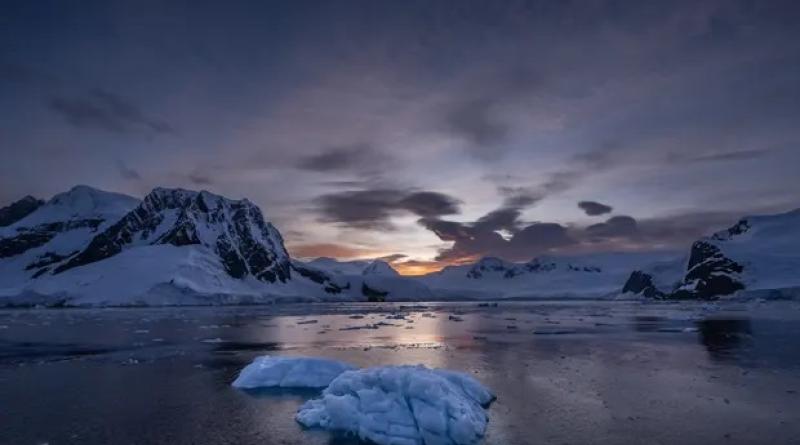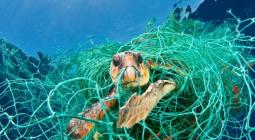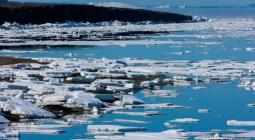From the oceans to ‘net zero’ targets, we’re in denial about the climate crisis

We’re all in denial, in one way or another. Maybe it’s the only way to get by. But we can’t avoid the evidence, collectively, in the long run.
On key measures, temperatures across the planet this year are off the charts. This is especially the case in the ocean.
Since April, the average global sea surface temperature has spiked far beyond anything ever recorded.Down south, the ocean surrounding Antarctica isn’t freezing the way it usually does. Sea ice levels are at the lowest level on record for this time of year. Scientists say the Bellingshausen Sea on the west of the continent remains sea ice free despite now being in the grip of the polar night – months of 24/7 darkness.
This was not a scenario that was even being considered a year ago. “It’s completely unprecedented in the satellite record,” says Edward Doddridge, a research assistant with the Australian Antarctic Program Partnership.
The two obvious questions that flow from this are: what is causing it, and what are the ramifications?
Immediate and specific attribution is always challenging, but as Graham Readfearn reports, the ocean has been absorbing most of the energy trapped by greenhouse gases humans have pumped into the atmosphere in recent decades.
Since 1971 the ocean is estimated to have absorbed heat equivalent to the energy of more than 25bn Hiroshima-scale atomic bombs. No, I can’t get my head around that either. But payback – in the form of ice melt, sea level rise, more intense cyclones, increased flooding risk and damage to marine life – was always coming.
A recent study found a deep ocean current, known as the Southern Ocean overturning circulation, has already slowed by about a third since the 1990s – far more rapidly than forecast in climate models. It means there is less cold, deep ocean water pushing north. The ramifications for regional and global temperatures and weather patterns will take time to unfold, but are expected to be substantial and cascading.
This potential global-scale reset of a natural system has only had passing media attention, and even less political attention. It’s little wonder – the refrain from governments and businesses is that they are acting, having signed up for net zero emissions targets for 2050.
So far, these targets are mostly fig leaves. Renewable energy is coming on faster across the globe than was expected not long ago. It is cheaper and more accessible than ever. But that alone won’t get us there.
A study this week by Net Zero Tracker found the bulk of “net zero” commitments from fossil fuel companies were meaningless as they either included no short-term emissions reduction plans, or did not fully cover scope 3 emissions (that is, the pollution released when a company’s products are used).
It is a similar story with “national targets”. A study in the journal Science looked at about three dozen plans and found 90% were not credible and unlikely to be achieved. Australia was ranked in the bottom group of countries on the grounds it had “no detailed policy plan apart from vague and inconclusive explanations” in a long-term strategy submitted to the UN in 2021. The world’s two biggest emitters, China and the US, were considered one step above Australia, but still not good enough.
Australia’s poor performance in this study wasn’t particularly surprising. The Albanese government went to last year’s federal election with an emissions reduction plan for 2030 only, though some of its policies will continue beyond that. While its target of a cut by that date (compared with 2005) was much stronger than the Morrison government’s, it was not based on a scientific assessment of what was necessary. It is yet to release a long-term strategy to reach net zero by 2050 but says one is coming.
This week the government appointed a board for a new Net Zero Economy Agency that will be responsible for helping workers, industries and communities affected by the huge transition ahead. It’s a good idea. But, given there is no plan to get to net zero, there is a long way to go.
There are bigger problems with net zero. The principle is that, because it will be difficult to cut emissions in some areas, we will need to offset some pollution by removing CO2 from the atmosphere by, for example, planting trees. But in practice the approach is too often to turn straight to offsets, even where direct cuts are possible. Using offsets to justify new fossil fuel developments is ignoring and exacerbating the problem, not addressing it.
As discussed in a recent interview with academic and author Holly Jean Buck, no one ever formally decided “net zero” should be the shared target of global climate efforts. It was a scientific and modelling term that was sort of just absorbed by countries, cities and corporate leaders via the Paris agreement. But it was never meant to be the get-out-of-jail-while-continuing-to-emit card it has become.
In reality, the scientific consensus is that we need to be aiming for negative emissions. That means phasing out fossil fuels in wealthy countries such as Australia as quickly as possible, not continuing to expand them.
Steps to remove carbon from the atmosphere need to be on top of that. Until we act on that – and start prioritising adaptation plans to deal with the changes already locked in – our collective denial will continue.
cover photo:Antarctica’s sea ice levels are at the lowest level on record for this time of year. Photograph: Anadolu Agency/Getty Images






